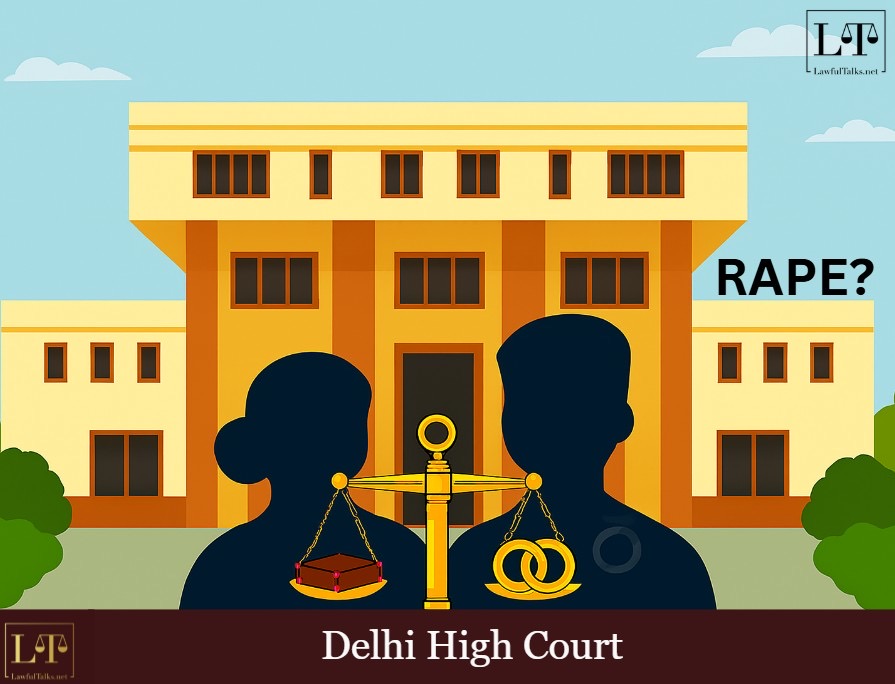Allahabad HC Sets Aside Afzal Ansari's Conviction, Allows Him to Continue as MP

An application under Section 482 of the Criminal Procedure Code, 1973 (“CrPC”) was filed before the Delhi High Court seeking to quash an FIR for rape under Section 376 of the Indian Penal Code, 1860 (“IPC”), where the central issue before the Single Bench of Dr. Swarana Kanta Sharma was whether the complainant, despite knowing the accused was married, had been deceived or exploited under the false pretext of marriage.

Background:
The complainant was a 24 years old woman, resident of Bihar, preparing for competitive exams like UPSC. She alleged that she suffered physical, emotional and sexual harassment by the accused, who according to her, promised marriage under false pretenses including fraud and cheating.
Initially, the parties had met in Patna with their families considering an arranged marriage but that possibility failed when the accused demanded a dowry of ₹1 crore. Regardless, they developed a close relationship and frequently visited several hotels together and engaged in sexual relations.
The complainant later learned that the accused had married another woman, Ms. X, for a dowry of ₹60 lakhs. But he claimed that the marriage was against his will. Despite this knowledge, when she got pregnant, he allegedly promised to leave his wife for the complainant and take care of their unborn child. He had even suggested backdating a marriage certificate to January 2024 to lend legitimacy to their relationship.
The complainant also alleged the accused threatened her and her family, provoked her suicide, and made her suffer mental harassment.
The accused's rebuttal is that the complainant validly married him in 2024 at Arya Samaj mandir in Bihar, and he married the complainant based on a marriage certificate that the investigating officer validated. He also argued that since the complainant was unwilling to publicly acknowledge the marriage, he married Ms. X because of family expectations.
The Court asserted, “It is well settled that, for attracting the offence of rape on the ground that consent was obtained on a false pretext of marriage, the prosecution must establish that the sexual relationship between the parties had been induced by a false promise of marriage from the very inception, and that the accused never had any intention of marrying the complainant.”
The Court also stated that the material-on-record showed that complainant and accused travelled together, in various locations across India, stayed at hotels, and had physical relations together, voluntarily.
Most importantly, the material also showed that even after the complainant had become aware that the accused had married Ms. X, they still travelled together and had physical relations together. The court observed that such circumstances supported the view that the relationship was consensual and not induced by false promises.
“In either eventuality, the record does not disclose material to conclude that the physical relationship between the parties was anything other than voluntary and consensual.” observed the Court.
The Court analysed the complainant's assertion that there could have been no solemnised marriage at Arya Samaj Mandir and that the certificate produced was fake and backdated.
The judge observed, “If it is the complainant‟s case, as alleged in the FIR, that no marriage had actually been solemnised at Arya Samaj Mandir and that only a backdated certificate had been fabricated, it remains unexplained why she continued to engage in sexual relations with the petitioner even after knowing that he had married another woman, thereby making a second marriage with her legally impossible.”
On the other hand, if the complainant was stating that she was married to the petitioner, then there would be no implication of rape on a false promise of marriage consideration, which would negate any sexual charge since they would be husband and wife following the law of marriage. The Court concluded that with either way, nothing in this scenario showed the parties' intimate relationship was non-consensual.
The Court emphasized, “The law governing offence of rape is intended to protect the bodily integrity and autonomy of women and to punish those who exploit them by force or by deception which vitiates free consent. It is not designed to become a tool in disputes where two consenting adults, fully aware of their choices and the attendant consequences, subsequently fall apart. Adults entering into intimate relationships must take responsibility for the decisions they voluntarily make, including the emotional, social, or legal risks inherent in such relationships. When a complainant, being an educated and independent woman, willingly continues to engage in such a relationship even with knowledge of the petitioner‟s marital status, it cannot thereafter be said that she was misled or exploited in law. “
Thus, the Court, in exercise of its powers under Section 482 of the CrPC, quashed the FIR alleging commission of offence under Section 376 of the IPC.
Case Title: ANKIT RAJ v. STATE OF NCT OF DELHI
Appearance:
For the Petitioner: Suryanarayan Singh, Senior Advocate, Raman Yadav, Priyam Kaushik, Aashi Arora, Harshith Pottangi, Akriti Chaturvedi, Ritika Arora, Advocates
For the Respondent: Naresh Kumar Chahar, APP, SI Soni Lal, P.S. Nabi Karim
Leave a Comment

Nikita Muddalgundi
Second Year, B.A. LL.B student
Latest Posts
Categories
- International News 19 Posts
- Supreme Court 286 Posts
- High Courts 301 Posts

























































































































































































































































































































































































































































































































































































































